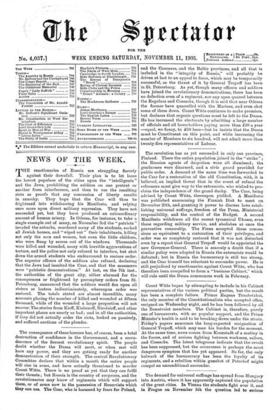The revolution has as yet succeeded in only one province,
Finland. There the entire population joined in the " strike " ; the Russian agents of despotism were all dismissed; the gendarmes were disarmed, and a civic guard provided for public order. A demand at the same time was forwarded to the Czar for a restoration of the old Constitution, with, it is believed, an implied threat that in the event of refusal the reformers must give way to the extremists, who wished to pro- claim the independence of the grand duchy. The Czar, being advised by Count Witte, thereupon yielded. A Manifesto was published summoning the Finnish Diet to meet on December 20th, and granting it power to discuss laws estab- lishing universal suffrage, freedom of the Press, Ministerial responsibility, and the control of the Budget. A second Manifesto withdraws all the recent tyrannical Ukases, even those regarding military service, and abolishes at once the preventive censorship. The Finns accepted these conces- sions as equivalent to a restoration of their privileges, and order was so completely restored that it was not disturbed even by a report that General Trepoff would be appointed the new Governor-General. There is scarcely a doubt that if a similar policy were adopted in Russia the extremists would be defeated ; but in Russia the bureaucracy is still too strong, and the Czar himself too reluctant to surrender power. He is still prejudiced by reactionaries against Count Witte, who has therefore been compelled to form a "business Cabinet," which will rule until the Duma commences work in February.












































